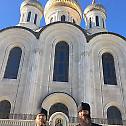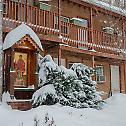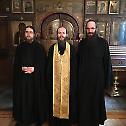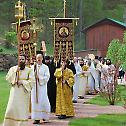Theology
Martyr Gorazd of Prague, Bohemia and Moravo-Cilezsk
4. September 2018 - 14:24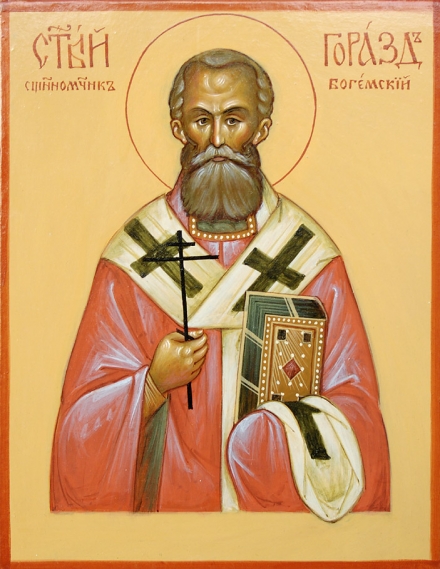 “I am the good shepherd. The good shepherd gives His life for the sheep” [John 10:11].
“I am the good shepherd. The good shepherd gives His life for the sheep” [John 10:11].
“O Lord, make this man also, who has been proclaimed a steward of the episcopal grace, to be an imitator of You, the true Shepherd, Who laid down Your life for Your sheep....” [Prayer of Consecration of a Bishop]. On September 25, 1921, these words were prayed over Father Gorazd Pavlik as he was consecrated the Bishop of Moravia and Silesia. It is doubtful that anyone in attendance that day, including the new bishop, expected that he would be called upon to live that prayer in a literal way.
Matthias Pavlik was born in 1879 in the Moravian town of Hrubavrbka in what would later become the Czech Republic. He was born into a Roman Catholic family, completed the Roman Catholic seminary in Olomouc and was ordained a priest.
Apostle Matthias of the Seventy
23. August 2018 - 15:28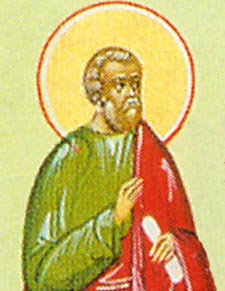 The Holy Apostle Matthias was born at Bethlehem of the Tribe of Judah. From his early childhood he studied the Law of God under the guidance of Saint Simeon the God-Receiver (February 3).
The Holy Apostle Matthias was born at Bethlehem of the Tribe of Judah. From his early childhood he studied the Law of God under the guidance of Saint Simeon the God-Receiver (February 3).
When the Lord Jesus Christ revealed Himself to the world, Saint Matthias believed in Him as the Messiah, followed constantly after Him and was numbered among the Seventy Apostles, whom the Lord “sent them two by two before His face” (Luke 10:1).
After the Ascension of the Savior, Saint Matthias was chosen by lot to replace Judas Iscariot as one of the Twelve Apostles (Acts 1:15-26). After the Descent of the Holy Spirit, the Apostle Matthias preached the Gospel at Jerusalem and in Judea together with the other Apostles (Acts 6:2, 8:14). From Jerusalem he went with the Apostles Peter and Andrew to Syrian Antioch, and was in the Cappadocian city of Tianum and Sinope. Here the Apostle Matthias was locked into prison, from which he was miraculously freed by Saint Andrew the First-Called.
Martyr Parasceva of Rome
8. August 2018 - 15:59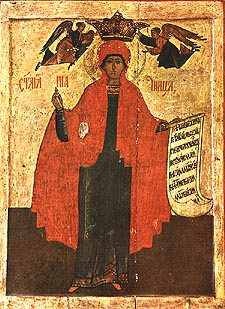 Holy Virgin Martyr Paraskeva of Rome was the only daughter of Christian parents, Agathon and Politia, and from her early years she dedicated herself to God. She spent much of her time in prayer and the study of the Holy Scriptures. After the death of her parents Saint Paraskeva distributed all of her inheritance to the poor, and consecrated her virginity to Christ. Emulating the holy Apostles, she began to preach to the pagans about Christ, converting many to Christianity.
Holy Virgin Martyr Paraskeva of Rome was the only daughter of Christian parents, Agathon and Politia, and from her early years she dedicated herself to God. She spent much of her time in prayer and the study of the Holy Scriptures. After the death of her parents Saint Paraskeva distributed all of her inheritance to the poor, and consecrated her virginity to Christ. Emulating the holy Apostles, she began to preach to the pagans about Christ, converting many to Christianity.
She was arrested during the reign of Antoninus Pius (138-161) because she refused to worship the idols. She was brought to trial and fearlessly confessed herself a Christian. Neither enticements of honors and material possessions, nor threats of torture and death shook the firmness of the saint nor turned her from Christ. She was given over to beastly tortures. They put a red-hot helmet on her head and threw her in a cauldron filled with boiling oil and pitch. By the power of God the holy martyr remained unharmed. When the emperor peered into the cauldron, Saint Paraskeva threw a drop of the hot liquid in his face, and he was burned. The emperor began to ask her for help, and the holy martyr healed him. After this the emperor set her free.
“We Work Out Our Salvation Together”
7. August 2018 - 8:46A Conversation with Two Monks from the Hermitage of the Holy Cross
Fr. Macarius (Ruegemer) and Fr. David (Mahand) are monks from the Hermitage of the Holy Cross in West Virginia. Fr. Macarius is a hierodeacon and Fr. David is a riassophore monk. Their abbot blessed them to travel to Russia to see and experience the monastic life there, first staying at Sretensky Monastery for a week, having been invited by one of the brethren, and then to visit Optina for two weeks. In this interview, we spoke with them about life in their monastery, the formation of novices, and the spiritual advice, and above all, spiritual joy that they receive from their abbot, Archimandrite Seraphim.
—Fr. David and Fr. Macarius, can you tell us a bit about your monastery?
—Fr. David: The monastery was founded in 1986 by Hieromonk Kallistos, who was a Greek-American hieromonk serving a parish in the Russian Church Abroad. He asked the bishop if he could have a blessing to start a small brotherhood and a small sisterhood because there were some men and some women interested in the monastic life, and so Vladyka Alipy blessed him to found a brotherhood and sisterhood. Fr. Kallistos asked if the brotherhood could be dedicated to the Exaltation of the Cross. Vladyka Alipy said yes, but that there should also be a patron saint, someone who the monks could have a relationship with and ask for prayers from, so Vladyka Alipy gave us St. Panteleimon, whom we consider our patron saint.
Myrrhbearer and Equal of the Apostles Mary Magdalene
30. July 2018 - 14:30The Holy Myrrh-Bearer Equal of the Apostles Mary Magdalene.
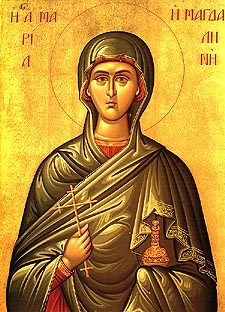 On the banks of Lake Genesareth (Galilee), between the cities of Capharnum and Tiberias, was the small city of Magdala, the remains of which have survived to our day. Now only the small village of Mejhdel stands on the site. A woman whose name has entered forever into the Gospel account was born and grew up in Magdala. The Gospel tells us nothing of Mary’s younger years, but Tradition informs us that Mary of Magdala was young and pretty, and led a sinful life. It says in the Gospels that the Lord expelled seven devils from Mary (Luke. 8:2). From the moment of her healing Mary led a new life, and became a true disciple of the Savior.
On the banks of Lake Genesareth (Galilee), between the cities of Capharnum and Tiberias, was the small city of Magdala, the remains of which have survived to our day. Now only the small village of Mejhdel stands on the site. A woman whose name has entered forever into the Gospel account was born and grew up in Magdala. The Gospel tells us nothing of Mary’s younger years, but Tradition informs us that Mary of Magdala was young and pretty, and led a sinful life. It says in the Gospels that the Lord expelled seven devils from Mary (Luke. 8:2). From the moment of her healing Mary led a new life, and became a true disciple of the Savior.
The Gospel relates that Mary followed after the Lord, when He went with the Apostles through the cities and villages of Judea and Galilee preaching about the Kingdom of God. Together with the pious women Joanna, wife of Choza (steward of Herod), Susanna and others, she served Him from her own possessions (Luke 8:1-3) and undoubtedly shared with the Apostles the evangelic tasks in common with the other women. The Evangelist Luke, evidently, has her in view together with the other women, stating that at the moment of the Procession of Christ onto Golgotha, when after the Scourging He took on Himself the heavy Cross, collapsing under its weight, the women followed after Him weeping and wailing, but He consoled them. The Gospel relates that Mary Magdalene was present on Golgotha at the moment of the Lord’s Crucifixion. While all the disciples of the Savior ran away, she remained fearlessly at the Cross together with the Mother of God and the Apostle John.
Imitate Their Faith
29. July 2018 - 12:58 Metropolitan Vladimir (Sabodan): A Homily on the Commemoration of the holy Equal-to-the-Apostles Vladimir
Metropolitan Vladimir (Sabodan): A Homily on the Commemoration of the holy Equal-to-the-Apostles Vladimir
This homily was delivered by the ever-memorable Metropolitan Vladimir (Sabodan), the predecessor to the current primate of the Ukrainian Orthodox Church His Beatitude Metropolitan Onuphry, on the day of his own patron saint. He served as a bishop in Christ’s Church from 1966, and as the primate of the Ukrainian Orthodox Church from 1992 until his repose on July 5, 2014 at the age of 78.

